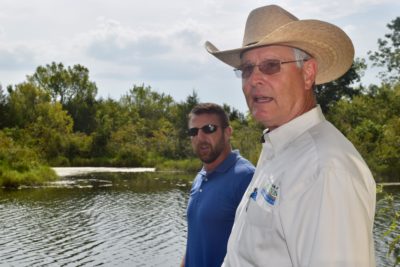
PORUM, Okla. – As impressive and historic as it is, there are a lot of things a person can’t see from Capitol Hill in the nation’s capital. Among those are the projects of the Abandoned Mine Land Reclamation Program in eastern Oklahoma.
So, in boots and jeans on a slightly muggy August morning, U.S Congressman Markwayne Mullin traveled Muskogee County roads in Oklahoma’s 2nd Congressional District which he has served since 2013.
To start the day, Congressman Mullin and Mike Stopp, the Congressman’s Chief of Staff, met in Porum, Okla., with Robert Toole, Director of the Abandoned Mine Land (AML) Reclamation Program for the Oklahoma Conservation Commission (OCC); Trey Lam, Executive Director of the OCC; and Mike Sharp, Assistant Director of AML for OCC. Chad Harsha, Secretary of Natural Resources for the Cherokee Nation, also attended the discussions at the Porum City Hall.
The briefing was held to inform Congressman Mullin and staff about the Abandoned Mine Land Program, particularly as it relates to Oklahoma and the need to reauthorize fee collections for continued AML Program funding.
“Congressman Mullin and his Chief of Staff Michael Stopp have always been very attentive, interested listeners who sought deeper understanding with relevant, focused questions that expanded their knowledge of the AML Program,” Toole said.
The mission of the AML Reclamation Program is to protect lives, repair scarred land and improve the environment. The purpose of the AML Program is to protect the public from hazards left as a result of past coal mining practices. The primary objective is to reclaim surface and underground coal mine sites abandoned prior to Aug. 3, 1977, that pose the highest threat to the public’s health, safety, and general welfare. The program is 100 percent federally funded from fees on active coal mine production. The AML Program coordinates with 16 eastern Oklahoma conservation districts in identifying hazardous AML sites, with particular emphasis placed on the public’s involvement.
From 1989 to 2018, in Oklahoma’s 2nd Congressional District, 169 projects have been completed spread out over 12 counties. Overall, in AML’s 16 county program area, 190 projects have been completed.
Also, in AML’s program area, there are still un-reclaimed abandoned mine sites estimated to cost over $132 million to reclaim.
“While it’s important that we continue to use an all-of-the-above energy strategy, it’s also important that we are good stewards of our natural resources,” Congressman Mullin said. “The work that the Mine Reclamation program does, not only returns mines to useful land but serves an important public safety role. I appreciate the tour and briefings from the AML staff.”
In the briefing at the Porum City Hall, Toole shared information on the program with Congressman Mullin, such as Oklahoma’s AML Program purpose, mission, process, and those public safety issues eliminated. He also talked about Federal legislation introduced in the Senate and drafted for House discussion and introduction that reauthorizes and extends the collection of fees to continue funding the AML program.
From the City Hall, the group drove east of the community and stopped at a completed AML reclamation project that has an un-reclaimed AML across the road in southern Muskogee County. Toole explained the elimination of hazards on the reclaimed project and pointed out the same existing hazards on the un-reclaimed site across the road, using both for an on-site before reclamation and after reclamation view.
At one point the Congressman asked about the depth of the strip pit. Toole said the reclaimed strip pit depth ranged from 10 feet to 35 feet.
“The un-reclaimed pit was likely the same depth range since it was along the same coal vein,” Toole said.
They continued on with a windshield tour of two reclaimed sites along a heavily traveled county road that is also a school bus route. Toole explained the hazards addressed along the road to eliminate the threat to public safety that were a result of abandoned mine land.
“The meeting provided detailed information and offered the opportunity to answer questions about the AML Program, funding and unfunded reclamation needs,” Toole said, reflecting on the morning. “I shared about pending federal legislation to reauthorize fee collections and the need to reauthorize fee collections for continued AML funding to address the $132 million in unfunded reclamation needs. The tour provided the opportunity to see first-hand at an un-reclaimed abandoned mine site, the hazards discussed in the meeting. It was also an opportunity to see a completed reclamation project that accomplished Oklahoma’s AML mission to protect lives, repair scarred land and improve the environment.”
OCC also deeply appreciated Harsha attending the informational discussion.
“The Oklahoma AML Program, Office of Surface Mining Reclamation and Enforcement (OSMRE), the Cherokee Nation and the Muskogee County Conservation District are parties to a project involving Cherokee Nation land and private property that requires the involvement of all parties to effectively address the AML needs,” Toole said. “It is a joint project that maximizes the leveraging of resources to accomplish the AML mission.”
The briefing and tour were very productive.
“Congressman Mullin is always available both in DC and in his District to discuss natural resource conservation,” Lam said. “Being able to put boots on the ground at these abandoned mine sites, seeing the hazards and then the restoration tells the story much more effectively than a written report. Thanks again to Congressman Mullin for all he does to conserve, protect and restore Oklahoma’s natural resources.”